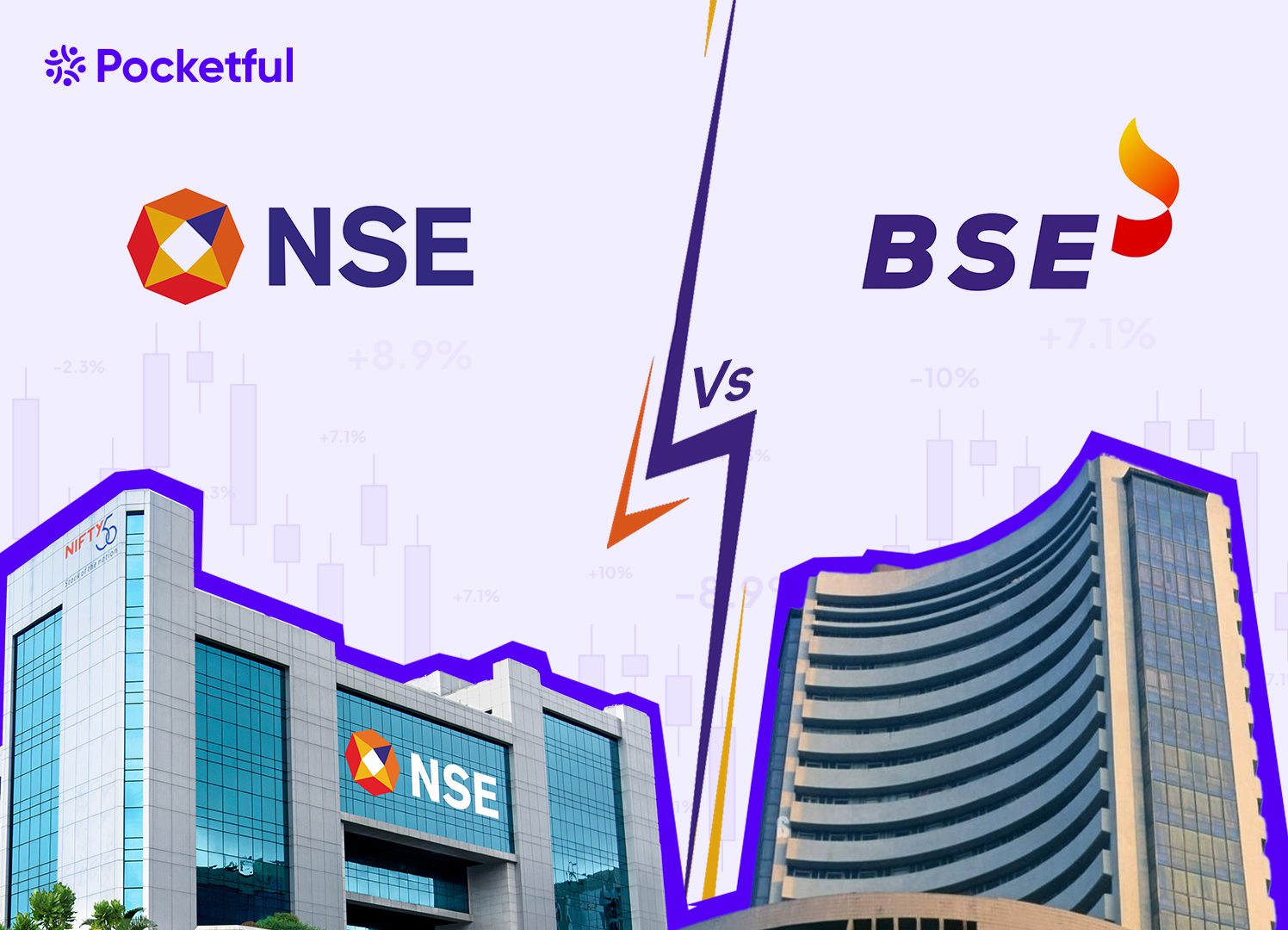| Type | Description | Contributor | Date |
|---|---|---|---|
| Post created | Pocketful Team | Mar-11-24 |

- Blog
- a comparative study on nse v s bse differences similarities and popularity
A Comparative Study on NSE v/s BSE: Differences, Similarities, and Popularity

Are you a beginner who wants to know about India’s two leading exchanges? This blog will briefly explain the workings of NSE and BSE.
The National Stock Exchange (NSE) was founded in 1992 and is the nation’s biggest stock exchange. On the other hand, the Bombay Stock Exchange (BSE) was founded in 1875 and is India’s oldest exchange.
Let’s distinguish between the NSE and BSE’s workings to help you understand their mechanisms.
NSE and BSE
Most of the trading in the Indian Stock Exchange takes place on these two stock exchanges:
- National Stock Exchange (NSE)
- Bombay Stock Exchange (BSE)
These follow the same trading mechanisms, trading procedures, and settlement processes. As of December 31, 2023, the NSE listed 2,302 companies, and the BSE listed 5,309 companies till Jan. 30, 2024. The NSE is large in volume, whereas the BSE is the larger stock exchange regarding the number of companies listed.
Both of these stock exchanges make it easy for people to buy and sell stocks and also help in the efficiency of the stock market.

What is NSE?
The National Stock Exchange is the largest stock exchange in India based on market capitalization and is headquartered in Mumbai, Maharashtra. It was established in 1992 and brought with it the electronic mode of trading. The National Stock Exchange uses the Nifty 50 as its primary index, which comprises the top 50 stocks of the exchange across different sectors.
It acts as a platform for buying and selling different financial instruments, which include equities, currencies, derivatives, and debt securities. In addition to the Nifty 50, other key indices of NSE include Nifty Next50, Nifty500, Nifty Midcap150, Nifty Smallcap250, and Nifty MidSmallcap 400.
What is BSE?
Established in 1875 and headquartered in Dalal Street in Mumbai, Maharashtra, the Bombay Stock Exchange is the oldest stock exchange in India and was formerly known as “The Native Share & Stock Brokers Association”. In 1986, Sensex was introduced as the first equity index and still comprises the top 30 stocks of BSE.
The Bombay Stock Exchange also has numerous indices such as BSE 100, BSE 200, BSE 500, BSE MIDCAP, BSE SMLCAP, BSE PSU, BSE Auto, BSE Pharma, BSE FMCG, and BSE Metal.
Similarities between NSE and BSE
Before moving forward to comparing both stock exchanges in NSE and BSE. Let’s have a look at the similarities first. The similarities are stated below:
- Both of these stock exchanges are popular among the investors.
- NSE and BSE both allow stock trading.
- Apart from equities, you can trade in bonds, mutual funds, ETFs, commodities, derivatives, futures, options, and currencies on these stock exchanges.
- Both stock exchange bodies are registered under SEBI (Securities and Exchange Board of India).
- Both of these stock exchanges are headquartered in Mumbai.
- Both of these stock exchanges have electronic trading facilities.
- Both exchanges list all mainboard IPOs but SME IPOs have an option to choose the exchange they want to get listed on.
NSE v/s BSE
This section will discuss the differences between these two stock exchanges. Let’s have a look into it:
| Basis | NSE | BSE |
|---|---|---|
| Acronym | National Stock Exchange | Bombay Stock Exchange |
| Established in | 1992 | 1875 |
| Primary index | Nifty 50 | S&P BSE SENSEX |
| Companies in the Primary index | 50 | 30 |
| Companies listed on the exchange | 2,302 | 5,309 |
| Global Ranking (By Market Cap) | 6 | 10 |
| Trading Volume | Higher than BSE | Lower than NSE |
| Products traded | Equity stocks, Equity derivatives, Currency derivatives, Commodity derivatives, Mutual funds, Exchange-Traded Funds, and many more. | Equity stock, currency derivatives, corporate bonds, Mutual funds, and many more. |
| Market Capitalisation | Approx. Rs. 334.7 lakh cr. | Approx. Rs. 333 lakh cr. |
| Liquidity | Due to higher volume, NSE provides higher liquidity | Due to lower volume, BSE provides lower liquidity |
Popularity Among Investors
Over time, NSE overtook BSE to become the nation’s leading stock exchange for some of these reasons. The reasons are stated below:
- Technology: NSE is run on a more advanced and reliable technology infrastructure, allowing faster and more effective trading than BSE.
- Products: NSE offered a comprehensive variety of financial products, including derivatives (initially unavailable on BSE), which attracted more investors and traders.
- Liquidity: NSE was known for its higher liquidity levels, which meant quicker and easier trading.
- Efficiency: NSE introduced numerous measures to increase efficiency, stabilising the market during volatile times.

Which platform to choose?
Both NSE and BSE provide trading opportunities in different types of securities. However, NSE boasts of a larger trading volume making it more straightforward for the price discovery mechanism to work efficiently. Some of the stocks are only registered under BSE; if you want to invest in such stocks, you might have to trade on BSE.
Conclusion
In this blog, we saw the comparison between the NSE and BSE to choose which platform is more suitable for investors in the stock exchange. We also saw similarities among NSE and BSE.
Both stock exchanges are secure and provide efficient online services; hence, both are excellent choices, but NSE becomes the natural choice for investors seeking higher liquidity.
Frequently Asked Questions (FAQs)
- Which is better: NSE and BSE?
Ans. While BSE boasts a larger selection of stocks, NSE provides greater volume and liquidity.
- Can I buy on the BSE and sell on the NSE?
Ans. Yes, Shares can be bought on one exchange and sold on another, but only on the next day, i.e., on T+1.
- Which exchange has better liquidity?
Ans. The National Stock Exchange (NSE) provides higher liquidity than the BSE due to its higher trading volume.
- Who regulates BSE and NSE?
Ans. SEBI (Securities and Exchange Board of India) regulates both BSE and NSE.
- What is the full form of Sensex and Nifty?
Ans. Stock Exchange Sensitive Index is the full form of Sensex and National Stock Exchange Fifty is the full form of Nifty.
Disclaimer: The securities, funds, and strategies mentioned in this blog are purely for informational purposes and are not recommendations.
Disclaimer
The securities, funds, and strategies discussed in this blog are provided for informational purposes only. They do not represent endorsements or recommendations. Investors should conduct their own research and seek professional advice before making any investment decisions.